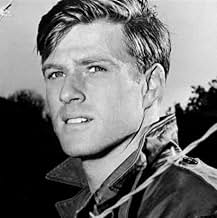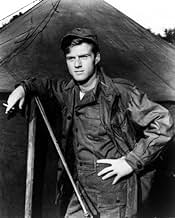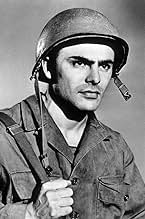Füge eine Handlung in deiner Sprache hinzuDispatched to the front lines during the Korean War, an idealistic American soldier discovers the horrors of combat and comes at odds with a psychopathic member of his platoon.Dispatched to the front lines during the Korean War, an idealistic American soldier discovers the horrors of combat and comes at odds with a psychopathic member of his platoon.Dispatched to the front lines during the Korean War, an idealistic American soldier discovers the horrors of combat and comes at odds with a psychopathic member of his platoon.
- Nominiert für 1 BAFTA Award
- 2 Gewinne & 1 Nominierung insgesamt
- Army Truck Driver
- (Nicht genannt)
Empfohlene Bewertungen
Anyway, my point is that this was a non-studio production of stark originality at a time when war was still being celebrated by a WWII-besotted studio industry. War Hunt is not exactly an anti-war film on the order of a Paths of Glory or Attack-- after all, Endore's scary psychopath can be shrugged off as a wild exception to the average GI. What the movie does suggest is that a deranged mind like Endore's can prove highly useful in wartime, even get a medal slapped on his chest for the tactical value his obsession with killing provides (on a more strategic scale, consider the intellectual value of the equally deranged Dr.Strangelove).
Because of his battlefield information, Endore is allowed to fight his own war, by his own rules, free from the restrictions placed on normal soldiers, while command looks the other way. In short, Endore's particular form of psychosis finds a home in combat where it not only thrives, but also proves of real instrumental value to the higher-ups. In peacetime, he would get a strait-jacket; in wartime, he gets a commendation. Whether his psychopathic actions also promote a greater good amounts to an unspoken ethical dilemma not taken up by the picture-- and is likely why the script fudges the dilemma by having his obsession threaten the very truce itself. (An unlikely consequence since truces are notoriously slow to take hold, anyway.)
The movie itself is no unmixed triumph. There's no motivation for Loomis' standing up to Endore over the Korean boy, unless we extrapolate some symbolism about youth representing the future and Loomis standing for American idealism. In fact, the film's very last line supports some such surmise. Moreover, John Saxon's Endore is truly frightening-- until he opens his mouth. I don't know whether it's the uninspired lines given him or Saxon's rather pedestrian delivery, but neither measures up to Saxon's coldly menacing presence nor the character's bold concept. Then too, the scene with battalion command fails because no one, including Saxon, has a good grasp of how a unique character like Endore should handle it. (And on a more minor note: How could he possibly get through Basic Training since he doesn't just resist authority, he can't even comprehend it!-- as the battalion command scene shows.)
On the plus side stands Redford's nicely understated Loomis, whose character wisely resists heroic proportions. Charles Aidman too, comes across intelligently as a weary and beleaguered company commander willing to bend the rules for tactical advantage. At the same time, as others point out, the photography is appropriately grainy and gritty, blending well with the occasional stock footage. But most of all, there remains that frighteningly eerie glimpse of Endore's demonic little dance around his latest slashed throat. What mysterious god of madness is he invoking somewhere inside that dark pool that is his psyche. And what strange secrets has he imparted to the boy to carry into the future. I've seen nothing like this peculiar ritual before or since, and it is truly more unsettling than the gallons of fake blood spilled by contemporary horror-fests.
Judging from the Sanders' profile, it looks like their careers petered out on television. What a disappointment after such a promising beginning. There must be some inside story here that I wish I knew. Be that as it may, War Hunt remains truly one-of-a-kind, a really scary glimpse of a mysteriously psychotic figure freed up by the dogs of war.
Running less than 90 minutes, "War Hunt" tells a powerful story about the toll of warfare on those who fight it. Idealism, patriotism and notions of heroism are forgotten in the midst of battle. Instead of making men into saints, war usually turns them into demons. Pvt. Loomis (an impossibly young Robert Redford) arrives in Korea during the last few weeks of the war. He meets Raymond Endore (John Saxon, "The Cavern"), an unhinged draftee who thrives on night patrols, during which he kills North Korean soldiers in their sleep. Endore has taken Charlie (Tommy Matsuda), a Korean orphan, into his care and Loomis also befriends the boy, hoping to wrest him away from Endore's dangerous influence.
Much like "Hell is for Heroes" which premiered the same year, "War Hunt" was shot on a shoestring budget in the Midwestern United States. From start to finish, it's obvious that the military did not back the production. After all, this is a very anti-military movie. There are only a few extras on-hand and we only see a few trucks. The lack of financing really shows through in the climactic scene in which hordes of Chinese troops attack the entrenched Americans; most of the explosions and reactions to them look utterly false and stagy.
Thankfully, this is not a picture about action and the glory of war it's about the aftermath of such scenes. The fighting serves to push the conflict forward in the quiet moments of rest and recuperation when the bullets are done flying. In fact, in the film's third act, set during the cease-fire with the Chinese, the most devastating violence occurs. Endore sets off with Charlie to live in the mountains after the war's end, refusing to admit that he is part of the Army and must return home. The final conclusion between Endore and Captain Pratt (Charles Aidman) is quick, gritty and comes to an unexpected, powerful conclusion.
Sanders' ensemble cast is superb in every way. Redford, in his film debut, is actually quite memorable as Loomis. The first time we meet Loomis, we already know what to expect: we've seen this type of clean-cut, fair-haired boy before. He'll go on to undergo a baptism of fire and become the hero of the piece. Not so, here. Loomis arrives in Korea with ideals and patriotism; much like Charlie Sheen's Chris Taylor in "Platoon", he comes to realize that there are only two kinds of men in warfare: those who crack under its pressures, like Endore, and those who just want to survive, like his new found friends Crotty (Gavin MacLeod) and Showalter (Tom Skerritt). His scenes between Charlie are tender, poignant and moving. His encounters with Endore are chilling and unconventionally solved. As Endore, John Saxon brings a new meaning to the word psychopath. We've never met a wacko like him before. His mannerisms, dialog, expressions, are all played with utter randomness. It's as if he was handed the role and told "do what you want with it". There are times when Endore is almost completely human, but something in his eyes tells us that perhaps there is something slightly wrong with this guy. As the nature of his character is gradually revealed, we can't help but become shocked, almost frightened.
"War Hunt" is a cliché-free, freshly original and involving drama. It makes a strong statement about war's general destructive nature. This is a movie about survival and flawed idealism, not heroism and courage. Kudos to the director for choosing to pick such a controversial subject. The film is almost prophetic in that it approaches the Korean War with an attitude that would come across with force and power in Vietnam films 25 years later, like "Hamburger Hill" and "Platoon".
The film is set during the last days of the Korean War. Endore (John Saxon) conducts voluntarily patrols to Chinese outposts, and is valued by his commanding officer. The other platoon members appreciate Endores courage and toughness under fire, and probably love the fact his solitary patrols keep them safe in their own lines. But Endore has his own personal motives for his nocturnal sojourns. He gets to kill people, and he probably enjoys it. As a matter of fact, he most likely is a serial killer. No doubt he is a social outcast in civilian life and would be even in the peacetime army. In any other environment, hed wind up in a prison or mental hospital. Luckily (for him) the Korean battlefront is his element.
John Saxon plays Endore to frightening perfection. Blank, emotionless facial expression. Psychotic stare, just a hint of malevolent violence seething beneath his limited social skills. In the films scariest scene, Endore knifes a Chinese soldier to death unnecessarily, then dances around the body. A ritualized killing. Endore is one scary stranger. Id stay away from him, so would you. Hes the guy we read about in the papers, maybe even joke about nervously.
This crazy mans nemesis arrives in the form of Roy Loomis, a young and frightened recruit. He is shocked and disgusted by Endores actions, but is rebuffed by his CO and squadmates. Loomis isn't worth anything. It's Endore who is valuable, who can kill, who can do the dirty work. Loomis is annoyingly innocent however, and you know there's going to be a big confrontation coming up.
The confrontation arrives in the form of a cease fire.The Korean War is ending, but has Endores war just begun? Check it out and see. Fast moving, suspenseful, frightening. Best line: Endore(explaining how he can sneak up on the enemy without being seen) "Because I'm invisible---the truth blinds you."
Wusstest du schon
- WissenswertesFeature film debuts of Robert Redford, Tom Skerritt and Sydney Pollack. Thirty years on, Redford would direct Skerritt in Aus der Mitte entspringt ein Fluß (1992).
- Zitate
[first lines]
Pvt. Roy Loomis: Once you get out of training, you're funneled into what's called the pipeline, and you become a number while you're traveling in it, until you get spewed out somewhere at the other end. After you land, you look for signs of war. A bullet scar in a wall, a bombed out building. You don't have to look very hard. You see a lot of poverty, kids starving. When you get out of the trucks after the ship and the train, you know the pipeline is carrying you further toward the front. You're going to be a combat infantryman, the tip of the spear. You don't know what it will be like or what will happen. You wonder whether you're going to get killed.
- VerbindungenFeatured in Best in Action: 1962 (2018)
Top-Auswahl
- How long is War Hunt?Powered by Alexa
Details
Box Office
- Budget
- 300.000 $ (geschätzt)
- Laufzeit1 Stunde 23 Minuten
- Farbe
- Seitenverhältnis
- 1.66 : 1































